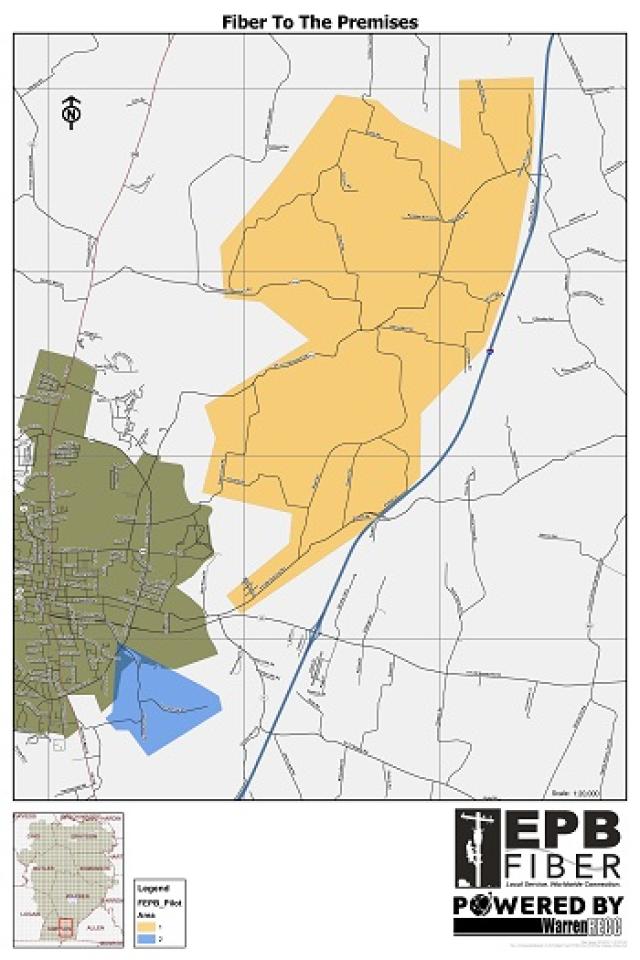
Fast, affordable Internet access for all.

Franklin, Kentucky’s (pop. 8,400) electric utility is gearing up for an expansion of its partnership with Warren Rural Electric Cooperative Corporation (WRECC) with the help of $2.3 million from the recent FCC Rural Digital Opportunity Fund (RDOF). The new partnership will allow Franklin EPB to add new service to roughly 250 locations adjacent to a current project in the area.
The expansion project will add subscribers in the northeast region of Simpson County and nearby parts of the city of Franklin in the south-central part of the state, where the two entities are operating a two-area fiber pilot.

A Tennessee communications cooperative will soon bring fiber connectivity to Kentucky’s Warren County. North Central Telephone Cooperative (NCTC) will offer high-quality Internet access via gigabit (1,000 Megabits per second) connectivity via its North Central Communications, Inc., subsidiary.
Starting With New Construction
NCTC will start in a new subdivision and has already installed fiber prior to new home construction. The cooperative will also offer services in a nearby apartment complex. NCTC will make Internet access along with video service available to the new homes that are not yet built. They intend to expand to other multi-dwelling units and subdivisions in the area and hope to develop a larger regional footprint.
In order to accomplish their goal, NCTC is enlisting the help of other local entities:
“We’re talking to Warren Rural Electric Cooperative and Bowling Green Municipal Utilities, trying to implement your vision that everyone in Warren County is served by broadband eventually,” said [Nancy White, NCTC CEO]. “We all have the same vision to provide broadband to as many people as want it.”
Not A Stranger To Kentucky
Approximately 120,000 people live in Warren County with a little more than half making their homes in the county seat of Bowling Green. The population has increased steadily by double digits since 2000. It’s located in the south central area of the state and also home to Southcentral Kentucky Community and Technical College and Western Kentucky University.
On September 8th, the Warren County Fiscal Court approved a non-exclusive franchise agreement to allow NCTC to serve people in the county. NCTC is already serving subscribers in Allen County as part of the Kentucky Wired project. Warren County adjacent on the northwest border of Allen County.
“They’ve been in Allen County for quite some time, and I have nothing but good things to say about them,” Allen County Judge-Executive Johnny Hobdy said. “They have continued to upgrade and bring service to parts of our county that hadn’t been served. I think Warren County will be satisfied with their service.”
Competitors will pay less for programming than you do, and in turn play hard ball by lowering rates for customers. Good luck keeping up with technological advances, expansion needs and growth costs; it's a risky proposition for a public entity used to maintaining rather than adapting. Your opportunities will be limited because you can't provide services outside the city limits. You'll be criticized for offering programming such as adult movies, and you'll be told you really should be focusing on your core business: running power, water and wastewater plants.Terry Huval delivered that message in 2000, long before Lafayette committed to building their community fiber network -- a network that delivers some of the fastest speeds in the nation at the lowest rates and has already delivered hundreds of jobs. Nonetheless, LUS Fiber is behind the take rate goals they had set in the business plan. The expenses are higher than forecast because Lafayette was unfairly denied entry to a coop that secures lowers rates for television contracts for members. The only discernible reason for rejecting Lafayette is that Cox joined the coop after Lafayette committed to building its network. There is little doubt that Cox was influential in denying Lafayette's application, likely increasing LUS Fiber expenses for offering cable channels by more than 20%. This is just one of the many ways that the telecommunications market is rigged to benefit incumbents at the expense of all of us -- residents and small businesses alike. We will not have real choices in competition until government policy treats telecom like the essential infrastructure it is. Mike Stagg, a long time supporter of the network is quoted in the article, challenging LUS Fiber to improve its marketing:
Can they do better? Probably so. Part of it is the fact that, just from a mindset standpoint, LUS is a utility and utilities generally do not compete," Stagg said.